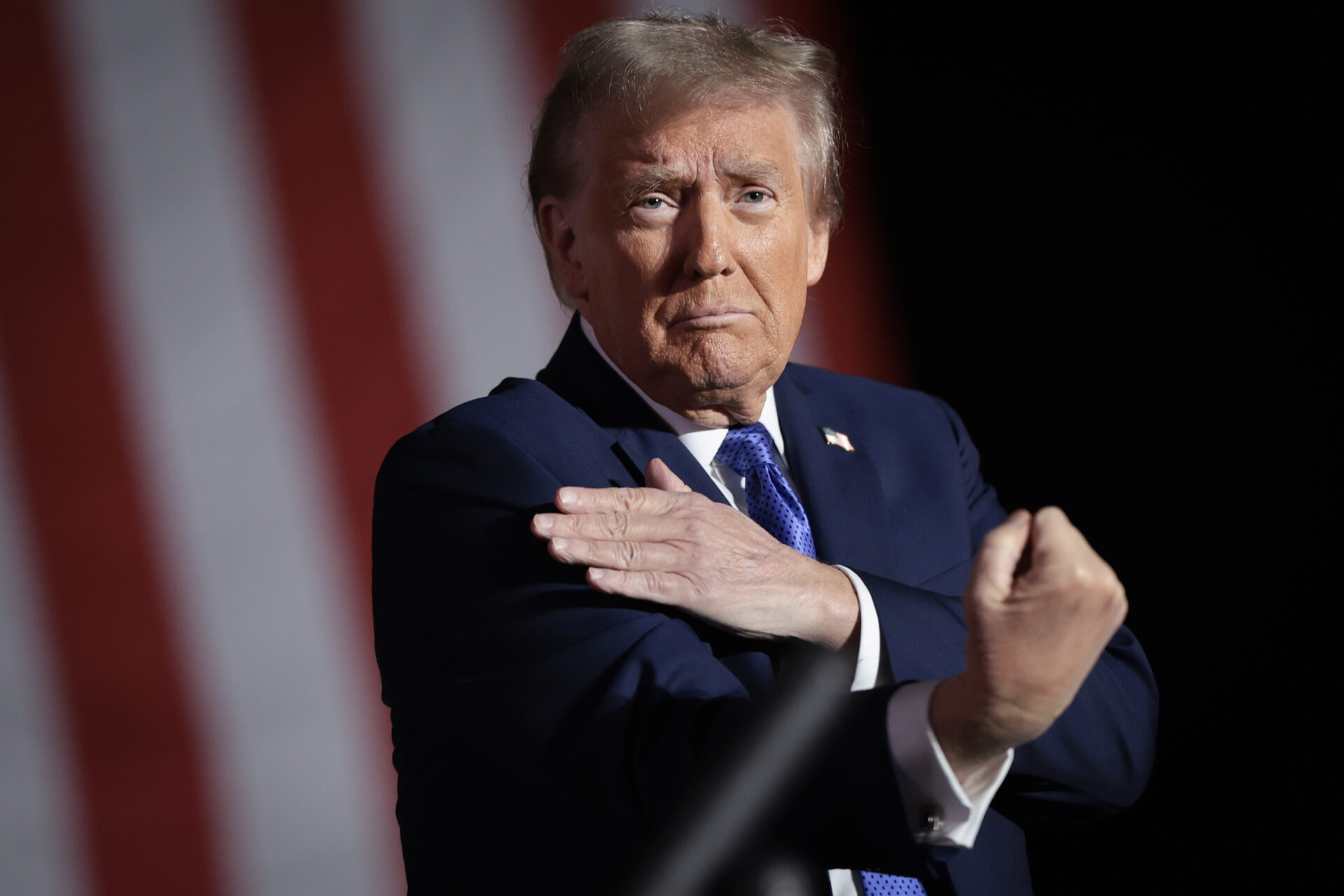The Intercept
Donald Trump gestures to the crowd as he concludes a campaign rally on Oct. 19, 2024, in Latrobe, Pa.
Photo: Win McNamee/Getty Images
For decades, reporters have been taught not to make Hitler analogies in stories about American politics. Adolf Hitler was so uniquely evil that any comparison of an American politician with the Nazi leader was considered unfair and out of bounds.
And then came Donald Trump.
Trump is the first modern American political figure to force journalists to reassess whether Hitler references meet their editorial standards.
In my columns and other articles for The Intercept, I have drawn attention to the increasingly obvious parallels between Hitler and Trump and between the Nazi movement and the MAGA cult. Yet most mainstream journalists have stubbornly stuck to the de facto ban on Hitler analogies and have refused to compare the two. That reluctance to point out the truth about Trump has been part of a larger pattern in the media of the so-called sane-washing of Trump, in which his demagoguery, wild conspiracy theories, and racist proposals are given credence and serious treatment by the political press corps.
But in explosive new statements, Trump’s own former White House chief of staff has made it virtually impossible for the press to justify a continued ban on Trump/Hitler references. John Kelly, a retired Marine general and Trump’s longest serving chief of staff, told the New York Times and The Atlantic in interviews published this week that when he was president, Trump made it clear that he admired Hitler and yearned for his authoritarian power.
Kelly said that Trump repeatedly said in private that Hitler “did some good things,” and that Trump said he wanted the kind of “German generals” who served under Hitler and committed unspeakable war crimes in World War II.
Kelly said he is convinced that Trump is a fascist.
In his interview with the New York Times, Kelly pointed out the definition of fascist, and said that it fits Trump: “Well, looking at the definition of fascism: It’s a far-right authoritarian, ultranationalist political ideology and movement characterized by a dictatorial leader, centralized autocracy, militarism, forcible suppression of opposition, belief in a natural social hierarchy … he certainly falls into the general definition of fascist, for sure.”
Meanwhile, Kelly told The Atlantic that Trump wanted American generals to act like Hitler’s Nazi generals. Kelly recalled asking Trump, “‘Surely you can’t mean Hitler’s generals?’ And he said, ‘Yeah, yeah, Hitler’s generals.’”
It has been widely known for years that Kelly knew explosive details about Trump’s time in the White House, but he has largely remained silent until now. He says that he has finally decided to reveal what he knows about Trump because he was fearful of Trump’s recent statements that he wants to use the U.S. military against his political rivals and dissidents. Trump has called his political opponents the “enemy from within,” and Kelly said that those statements finally prompted him to go public.
It is important that Kelly has finally spoken out before the election. But he could have done this much earlier; it is a wonder that the January 6 insurrection didn’t prompt him.
Of course, January 6 also didn’t convince the mainstream press to begin to regularly compare Trump to Hitler, even though the similarities between the 2021 insurrection and Hitler’s Beer Hall Putsch in 1923 were there for all to see.
The irony is that if Trump was a political figure in another country, the American press would have long since labeled him an autocrat. The U.S. media is susceptible to domestic pressures and so frequently avoids obvious truths about American political figures and about the actions of the U.S. government. In fact, the refusal by the American press to say that Trump is a would-be dictator is similar to the way in which the U.S. press refused to say that the Central Intelligence Agency had tortured prisoners at its black-site prisons during the war on terror. Rather than say that the CIA engaged in torture, the press shamefully used euphemisms like “enhanced interrogation” and “harsh interrogation.” For many years, the use of the word “torture” to describe what the CIA did was forbidden at many news organizations. That rhetorical smoothing helped the CIA avoid accountability.
Today, the press needs to avoid repeating that failure and plainly draw comparisons between Trump and Hitler.
Now, finally, Kelly’s statements provide all the ammunition that the press needs. He has confirmed that Trump wants to be a dictator and that he represents an existential threat to American democracy. His warning comes like a fire bell in the night that the American press — and the American people — must heed.
The post Mainstream Media Was Afraid to Compare Trump to Hitler. Now the Press Has No Excuse. appeared first on The Intercept.
James Risen, Politics, Voices Read More
Author Profile
Latest entries
 HeadlinesOctober 31, 2024Browns QB Jameis Winston defends viral pregame speeches: 'This is who I am'
HeadlinesOctober 31, 2024Browns QB Jameis Winston defends viral pregame speeches: 'This is who I am' HeadlinesOctober 30, 2024Puerto Rico Shadow Senator endorses Trump at PA rally after 'Kill Tony' controversy at MSG
HeadlinesOctober 30, 2024Puerto Rico Shadow Senator endorses Trump at PA rally after 'Kill Tony' controversy at MSG ScienceOctober 30, 2024People don’t like stories they think AI wrote
ScienceOctober 30, 2024People don’t like stories they think AI wrote HeadlinesOctober 30, 2024JESSE WATTERS: Kamala is campaigning like Biden now
HeadlinesOctober 30, 2024JESSE WATTERS: Kamala is campaigning like Biden now

